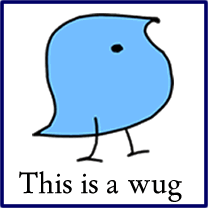
A nonce word is “a word occurring, invented, or used just for a particular occasion”, or “a word with a special meaning used for a special occasion” [source].
The word nonce comes from the Middle English nonse / nones, from to þan anes / for þan anes (to/for the one (occasion, instance)). Here’s example of how it’s used: “That will do for the nonce, but we’ll need a better answer for the long term.” [source].
The term ‘nonce word’ was apparently coined by James Murray, the editor of the Oxford English Dictionary [source].
Some nonce words become more widely used. Others may be used only by certain people. Here are a few examples:
– quark – coined by James Joyce in Finnegans Wake. Adopted by Murray Gell-Mann for the subatomic particle [source].
– blurb – “A short description of a book, film, or other work, written and used for promotional purposes.” Coined by American humorist Gelett Burgess on a book dust jacket at a trade association dinner in 1907 [source].
– grok – “to drink; to drink in all available aspects of reality; to become one with the observed. Coined by Robert Heinlein in his book Stranger in a Strange Land (1961). Used to mean “to understand (something) intuitively; to fully and completely understand something in all of its details and intricacies.” [source].
– sniglet – coined by the American comedian Rich Hall for the 1980s TV series Not Necessarily the News. It is defined as, “any word that doesn’t appear in the dictionary, but should” [source].
– wug – a blue bird-like creature that appears in Jean Berko Gleason’s wug test, which investigates the acquisition of the plural form in English-speaking children. Know mainly to linguists. Also features in one of my songs.
A few nonce words I’ve coined include crumptious, snorf, snoob, zambalated, flartled, overflude, flimpsome, plood and tarpool. They appear in my song Plinkin Plookplooks.
I also coined the word omniglot in 1998. I wasn’t the first person to do so though – it also appears in Jenni Fleetwood’s 1988 book, The Intergalactic Omniglot. A book I didn’t know about until after I came up with the word. Has anybody read it?
Do you know of any other nonce words that have become more generally used?
Have you coined any yourself?
I’m wondering if or how this may be related to the word “nonsense” – any thoughts?
Melissa – nonce and nonsense are not related. Nonsense comes from non (not) & sense [source], which comes from the Old French sens, sen, san (sense, reason, direction); from the Latin sensus (sensation, feeling, meaning), from sentiō (feel, perceive) [source].